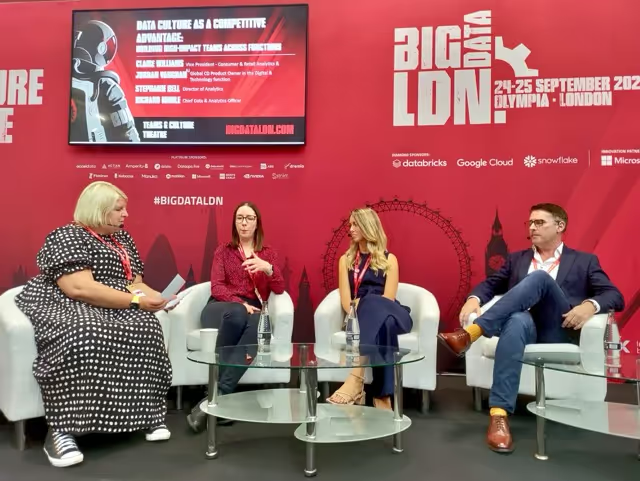
By Dr Sam Wrench and Kate Jacobs
For all the hype of big data and AI transformation, most organisations are still grappling with the basics. Fragmented data streams, siloed teams, patchy governance aren't new problems, but they're becoming more important, especially as data volume and velocity intensifies year on year.
These challenges were top of mind at this year's Big Data LDN, the UK's largest data conference. We were two of 15,000+ attendees, wandering among 200 exhibitors and taking in talks from 300+ speakers across a range of specialisms.
Three recurring themes resonated with us and our approach to data at RealityMine:
As artificial intelligence tools become more sophisticated, one truth remains stubbornly clear: the quality of insights depends on the quality of the data. However advanced the model, “garbage in, garbage out” still applies. At Big Data London, conversations kept circling back to this point — that governance, curation, and trust in data are the bedrock of AI adoption. Poor inputs lead to misleading outputs, eroding trust and slowing transformation.
What’s shifting is the recognition that data quality is not just a technical exercise, but a cultural one. Businesses need to embed shared ownership, stewardship, and transparency so that every dataset has integrity, not just accuracy. In the AI era, trust is the ultimate competitive advantage.

Several speakers highlighted that whilst governance, technology, and AI can help get your data right, they can’t build human-to-human trust. As AI advances, creating solid stakeholder relationships is becoming more central to every data professional’s role, regardless of job title.
Data is a team sport, not a transaction. Teams must bridge conversations across the organisation and get everyone invested — whether that’s through embedding specialists within business functions, cross-pollinating with stakeholders, or leading with commercial needs rather than tech for tech’s sake.
At RealityMine, we’ve taken this approach. Our data operations team sits within product and engineering. With Sam’s client relationships enforcing our closeness to the real problems that clients are facing, and Kate being embedded in marketing and business development, we’re at the cutting edge of unblocking our clients’ main challenges. This allows us to work seamlessly as internal end-users of our own data products — like modern-day mine canaries.
Another theme gaining real traction is the move away from fragmented systems toward more integrated data platforms. For years, organisations have wrestled with multiple pipelines, duplicate sources, and messy overlaps that dilute confidence. Now, there’s momentum behind solutions that centralise, clean, and connect data at scale — giving teams a single, trusted view of their world.
The benefits are twofold: data leaders can cut the time spent firefighting quality issues, while decision-makers gain richer insights across functions. At RealityMine, this approach underpins the way we design curated datasets that don’t just illuminate internal performance, but also reveal how a business sits within its broader market. When data is structured holistically, it shifts from being a noisy burden to a strategic compass.
The grand finale was a keynote speech by Professor Brian Cox, who tied together big data and the cosmos. During the audience Q&A, he amiably suggested we might all be doomed, reminding us that no civilisation has outsmarted its own extinction. On a brighter note, he argued that though AI is used to help code quantum computers, it can’t achieve independent thought – creative breakthroughs still depend on us.
It was a fitting end to the event, reminding us that while technological tools are powerful, they’re only as good as the quality, relationships, and systems we humans build around them.

Dr Sam Wrench is Data Operations Lead at RealityMine, where he drives the responsible use of data across products, teams, and systems. With a background spanning analytics, strategy, and psychology, he combines technical depth with people-first leadership — helping organisations build trust in data to make more informed, human-centred decisions.

Kate Jacobs is an Insights Analyst at RealityMine, where she works with the marketing and client-development teams to showcase the possibilities of RealityMine's data and support thought leadership. She also has a background in behavioural science and mixed-methodology research.